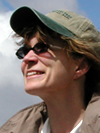2018 Israel C. Russell Award
Presented to Sherilyn C. Fritz
Citation by Jeffrey Stone
It is an honor to present Dr. Sherilyn C. Fritz for the Israel C. Russell Award for excellence in limnogeology. Sheri was awarded a PhD (Ecology) from the University of Minnesota (LRC) in 1985, working with the late Herb Wright. She continued at LRC for almost a decade, before becoming a professor at Lehigh University. In 1999, she joined the faculty at University of Nebraska-Lincoln and quickly reached the rank of Professor, and in 2004 she was awarded a distinguished university professorship.
Sheri’s earliest research applied fossil diatom records to reconstruct land-use practices, and she also pioneered transfer functions to reconstruct water chemistry. In post-doctoral research with Rick Battarbee, she published several landmark papers on lake acidification. Since that time, she has had a long-term interest in drought history through diatom-inferred salinity reconstruction, particularly in the US Great Plains, and has been involved in decades of research in the Greater Yellowstone region, together with Cathy Whitlock. Around the time Sheri started at Nebraska, she shifted her focus to South America, where she and long-time collaborator, Paul Baker, began exploring the paleoclimatic history of Lake Titicaca, Salar de Uyuni, and other sites in the tropical Andes. In her most recent adventures, Sheri is now at the forefront of the Trans-Amazon Drilling Project.
Sheri has authored/co-authored nearly 200 peer-reviewed publications and has been a principle investigator for over 50 external grants and contracts. She has a joint position in the Geology and Biology departments, which emphasizes her interdisciplinary approach to teaching and research. Sheri is deeply invested in the development of her students into successful scientists, which can be witnessed daily through her open-door policy and superb guidance. She has mentored 22 MS and PhD students and has acted as a research supervisor for 7 post-docs. Among her student advisees, Sheri is known as a jet setter, with a deep love for travel, new locations, and new experiences. She has a passion for good food, good friends, and she is a consummate professional. As someone who commands respect, has unbounded energy for science, and has vast interdisciplinary knowledge of limnogeology, Sheri is the unquestioned idol of every student that has come through her lab.
With all of these accomplishments in mind, I am delighted to present the Israel C. Russell award to my mentor, Dr. Sherilyn C. Fritz.
 2018 Israel C. Russell Award — Response by Sherilyn C. Fritz
2018 Israel C. Russell Award — Response by Sherilyn C. Fritz
I’m very honored to be awarded the GSA 2018 Israel C. Russell Award in Limnogeology. I am especially thrilled to be nominated by one of my former PhD students, Jeffery Stone, together with one of my current PhD students, Sabrina Brown – who did her MS degree with Jeffery. It is very exciting and fulfilling to see the evolution of a talented and multi-generational academic family tree.
I’m an ecologist by training, but I’ve spent nearly all of my academic career in geology departments and in the midst of geologists on a day-to-day basis. Those influences have expanded my world view and had a profound influence – as a result, I now consider myself a limnogeologist at my core, rather than an aquatic ecologist, although I find that the greatest insights emerge by balancing the two perspectives.
For me, a career is all about the people. My PhD advisor, geologist Herb Wright, left a strong imprint on my thinking and career. Herb always emphasized the importance of independence and a frame of reference that was international and interdisciplinary, and those values have propelled me forward over the years. While in Herb’s lab, I met several people that were mentors and that have been life-long friends, including Rick Battarbee and Svante Björck. I also met several fellow graduate students that I’ve collaborated with now for more than 30 years: Dan Engstrom and I did our PhDs together under Herb, and, just afterwards, started investigating the saline lakes of the Great Plains, recognizing their potential for reconstructing hydrologic history in the days when climate change was a relatively new topic. We also spent time in the dramatic landscape of Glacier Bay, Alaska studying lake evolution following deglaciation. John Anderson and I did our dissertations on paleolimnological records of human impact on lakes in Britain and spent considerable time as students commiserating over diatom taxonomy. Later we collaborated in Greenland on saline lakes and the complexities of watershed-lake interactions following deglaciation. I also met Cathy Whitlock as a student when she visited Herb’s lab, and we’ve enjoyed working together on a variety of projects in Yellowstone and the northern Rocky Mountain region. A “newer” collaborator, Paul Baker, invited me more than 20 years ago to work in Lake Titicaca. Since that time, we’ve explored many beautiful spots in the Andes and adjoining Amazon, including deposits of the Salar de Uyuni, lakes in the Bolivian and Peruvian Amazon, and Mio-Pliocene outcrops in northern Chile. It is primarily through these South American projects that I developed some street credibility in the deeper time aspects of limnogeology. Of course, students provide the spark and incentive to move into new areas, and over the years I’ve had ~30 graduate students and postdocs in my lab – too many to list here – but many have helped me to continue to expand my mind and my perspectives and have opened up new avenues for exploration and fun.
In short, history has created many strong threads and connections that have sustained my career and enriched my life. I’m very grateful to a large generous network of compelling colleagues and friends that have shared a lifetime of projects, a rich landscape of ideas, and many beautiful and interesting places on this Earth.

